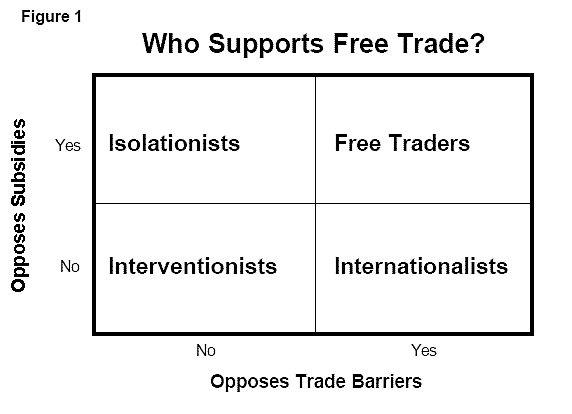With all the China bashing we’re hearing on the campaign trail and the arguments from both candidates that free trade agreements are good only because they increase manufacturing exports, one might reasonably deduce that free trade advocacy is a thing of the past and a losing position with the American people. If this is true, many in Congress haven’t gotten the memo. The House and Senate are home to many free traders. You can see for yourself by visiting Cato’s interactive trade votes database, Free Trade, Free Markets: Rating the Congress.
The Cato Institute has been keeping track of how Congress votes on trade issues since 1997. At the website you can see reports summarizing the votes for each congressional term. There is no report for last term (2009–2010) because Congress was too busy dealing with healthcare and Keynesian stimulus to take on trade issues, but the last two years have seen votes on free trade agreements, Chinese currency and subsidies, export finance, and sugar price controls. We’ll have a report after the current term ends on what all these votes mean for the freedom of Americans to interact with foreigners and on what to expect in the next two years.
The most enjoyable part of Free Trade, Free Markets: Rating the Congress is the ability to browse individual voting records. For any senator or representative who has served over the last 15 years, you can see a comprehensive report card that shows what they voted for or voted against. But they don’t just get a letter grade or percentage.
Each member’s record is plotted on a two dimensional graph that distinguishes between trade barriers and trade subsidies. Many representatives and senators vote against trade barriers but in favor of trade-distorting or protectionist subsidies. We call these folks Internationalists. Those who vote against subsidies but favor barriers are labeled Isolationists. Supporting both barriers and subsidies will place you in the Interventionist category, while consistent opposition to both sends you toward the venerable Free Trader designation.
The site offers excellent insight into the positions and ideologies of our elected officials, and I encourage you to investigate it at your leisure. As a primer, I would like to point out two important observations of my own in this post.
First, free trade is not a partisan issue. It is true that Free Traders tend to be Republicans and Interventionists tend to be Democrats, but the bulk of both parties are somewhere else on the graph and there is no obvious partisan correlation. For example, John Boehner (R‑OH) and Nancy Pelosi (D‑CA) have fairly similar scores that place them between Interventionist and Internationalist. There are plenty of Democrats who vote against trade barriers and plenty of Republicans who vote in favor of subsidies. It’s often regional interest rather than partisan affiliation that affects voting patterns, as demonstrated by Marco Rubio’s (R‑FL) support for sugar subsidies.
Second, senators from the same state can have widely different approaches to trade, especially in swing states. Three large swing states in the current presidential election have a Democratic senator elected in the 2006 midterm election and a Republican senator elected in the 2010 midterm election. Senators Rob Portman (R‑OH), Pat Toomey (R‑PA), and Roy Blunt (R‑MO) have earned high marks so far since joining the Senate in 2011. Senators Sherrod Brown (D‑OH), Bob Casey (D‑PA), and Claire McCaskill (D‑MO) have established themselves as solid Interventionists. Brown and Casey are among the most devout protectionists in Congress today.
The votes database suggests the hypothesis that giving lip service to free trade while advocating protectionism to boost manufacturing is a middle-of-the-road position for swing state voters that candidates are wise to adopt. But it also says that free trade can win elections in Ohio and Pennsylvania.
The trade votes database offers data to answer many compelling questions on trade policy positions. Three of the four names on the Republican and Democratic tickets have served in Congress—do their records on free trade match with their current positions? How have senators and representatives voted on China trade issues in the past? What issues does your representative think are more important than free trade? Take a look.

